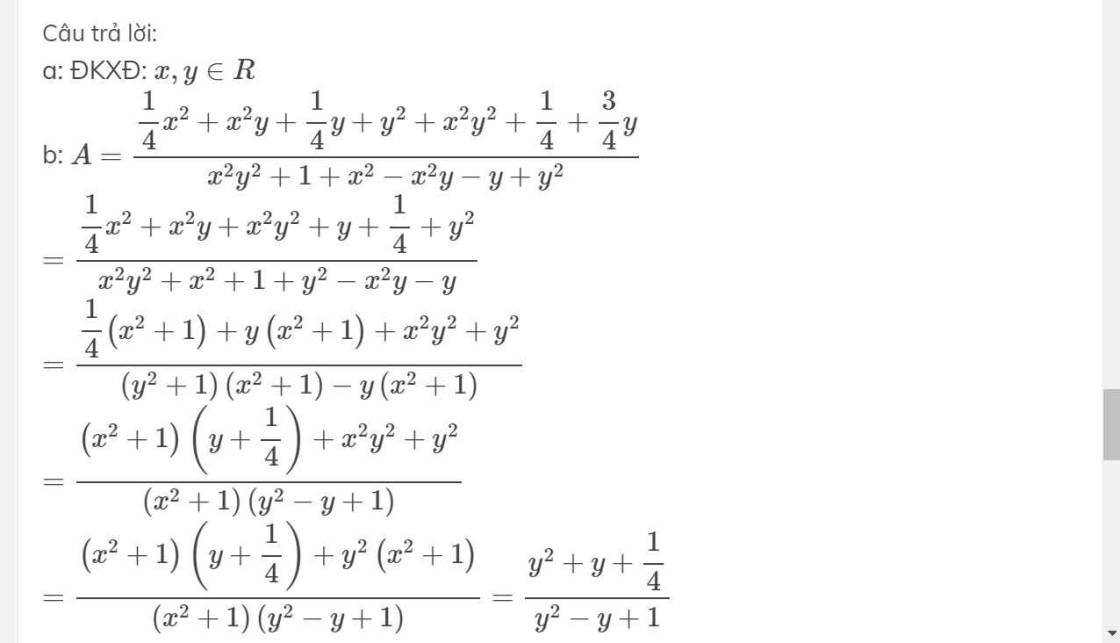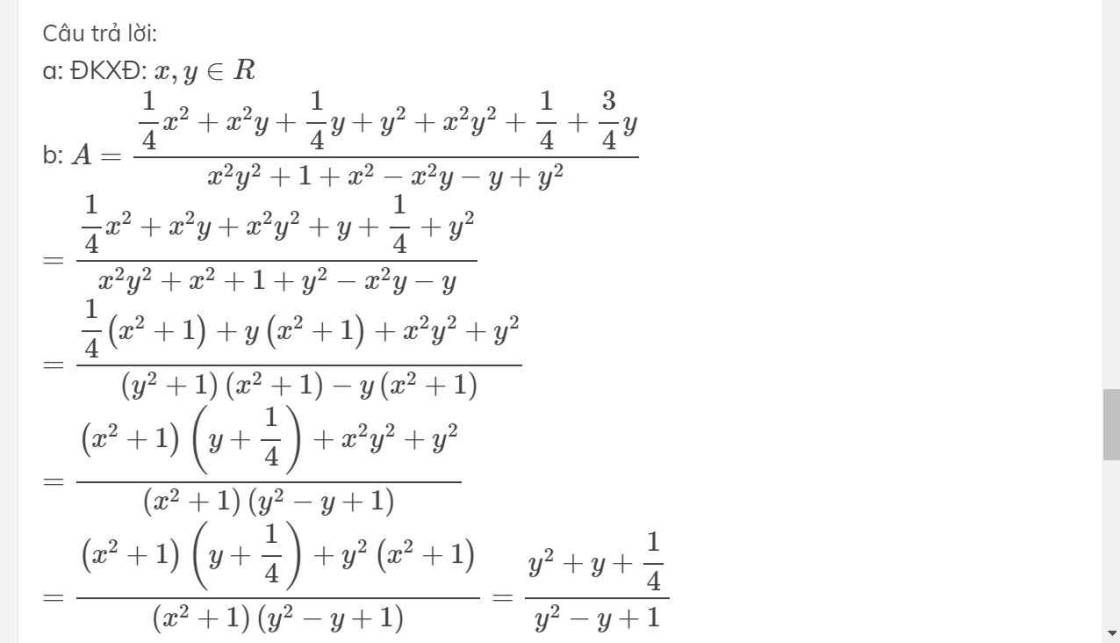Hãy nhập câu hỏi của bạn vào đây, nếu là tài khoản VIP, bạn sẽ được ưu tiên trả lời.

a)
\(\begin{array}{l}A = 0,2\left( {5{\rm{x}} - 1} \right) - \dfrac{1}{2}\left( {\dfrac{2}{3}x + 4} \right) + \dfrac{2}{3}\left( {3 - x} \right)\\A = x - 0,2 - \dfrac{1}{3}x - 2 + 2 - \dfrac{2}{3}x\\ = \left( {x - \dfrac{1}{3}x - \dfrac{2}{3}x} \right) + \left( {\dfrac{{ - 1}}{2} - 2 + 2} \right)\\ = - \dfrac{1}{2}\end{array}\)
Vậy \(A = - \dfrac{1}{2}\) không phụ thuộc vào biến x
b)
\(\begin{array}{l}B = \left( {x - 2y} \right)\left( {{x^2} + 2{\rm{x}}y + 4{y^2}} \right) - \left( {{x^3} - 8{y^3} + 10} \right)\\B = \left[ {x - {{\left( {2y} \right)}^3}} \right] - {x^3} + 8{y^3} - 10\\B = {x^3} - 8{y^3} - {x^3} + 8{y^3} - 10 = - 10\end{array}\)
Vậy B = -10 không phụ thuộc vào biến x, y.
c)
\(\begin{array}{l}C = 4{\left( {x + 1} \right)^2} + {\left( {2{\rm{x}} - 1} \right)^2} - 8\left( {x - 1} \right)\left( {x + 1} \right) - 4{\rm{x}}\\{\rm{C = 4}}\left( {{x^2} + 2{\rm{x}} + 1} \right) + \left( {4{{\rm{x}}^2} - 4{\rm{x}} + 1} \right) - 8\left( {{x^2} - 1} \right) - 4{\rm{x}}\\C = 4{{\rm{x}}^2} + 8{\rm{x}} + 4 + 4{{\rm{x}}^2} - 4{\rm{x}} + 1 - 8{{\rm{x}}^2} + 8 - 4{\rm{x}}\\C = \left( {4{{\rm{x}}^2} + 4{{\rm{x}}^2} - 8{{\rm{x}}^2}} \right) + \left( {8{\rm{x}} - 4{\rm{x}} - 4{\rm{x}}} \right) + \left( {4 + 1 + 8} \right)\\C = 13\end{array}\)
Vậy C = 13 không phụ thuộc vào biến x

a: \(B=\left(x^2+y\right)\left(y+\dfrac{1}{4}\right)+x^2y^2+\dfrac{3}{4}\left(y+\dfrac{1}{3}\right)\)
\(=x^2y+\dfrac{1}{4}x^2+y^2+\dfrac{1}{4}y+x^2y^2+\dfrac{3}{4}y+\dfrac{1}{4}\)
\(=x^2y+x^2y^2+y^2+y+\dfrac{1}{4}x^2+\dfrac{1}{4}\)
\(=y\left(x^2+1\right)+y^2\left(x^2+1\right)+\dfrac{1}{4}\left(x^2+1\right)\)
\(=\left(x^2+1\right)\left(y+\dfrac{1}{2}\right)^2\)
\(C=x^2y^2+1+\left(x^2-y\right)\left(1-y\right)\)
\(=x^2y^2+1+x^2-x^2y-y+y^2\)
\(=x^2y^2-y+x^2+y^2-x^2y+1\)
\(=y^2\left(x^2+1\right)-y\left(x^2+1\right)+x^2+1\)
\(=\left(x^2+1\right)\left(y^2-y+1\right)\)
=>\(A=\dfrac{y^2+y+\dfrac{1}{4}}{y^2-y+1}\)
b: \(=\dfrac{y^2-y+1+2y-\dfrac{3}{4}}{y^2-y+1}=1+\dfrac{2y-\dfrac{3}{4}}{y^2-y+1}>=1\)
Dấu = xảy ra khi y=3/8

a: A=-2/3x^4y^3
Hệ số: -2/3
Bậc: 7
b: Khi x=-1 và y=1 thì A=-2/3

\(A\)xác định \(\Leftrightarrow x^2y^2+1+\left(x^2-y\right)\left(1-y\right)\ne0\)
\(\Leftrightarrow x^2y^2+1+x^2-x^2y-y+y^2\ne0\)
\(\Leftrightarrow\left(x^2y^2+y^2\right)+\left(x^2+1\right)-\left(x^2y+y\right)\ne0\)
\(\Leftrightarrow y^2\left(x^2+1\right)+\left(x^2+1\right)-y\left(x^2+1\right)\ne0\)
\(\Leftrightarrow\left(x^2+1\right)\left(y^2-y+1\right)\ne0\)
\(\Leftrightarrow\left(x^2+1\right)\left[\left(y-\frac{1}{2}\right)^2+\frac{3}{4}\right]\ne0\)
Ta có: \(\hept{\begin{cases}x^2+1>0\forall x\\\left(y-\frac{1}{2}\right)^2+\frac{3}{4}>0\forall y\end{cases}}\)\(\Leftrightarrow\left(x^2+1\right)\left[\left(y-\frac{1}{2}\right)^2+\frac{3}{4}\right]>0\forall x;y\)
\(\Leftrightarrow\left(x^2+1\right)\left[\left(y-\frac{1}{2}\right)^2+\frac{3}{4}\right]\ne0\forall x;y\)
\(\Leftrightarrow A\ne0\forall x;y\)



a: ĐKXĐ: \(x,y\in R\)
b: \(A=\dfrac{\dfrac{1}{4}x^2+x^2y+\dfrac{1}{4}y+y^2+x^2y^2+\dfrac{1}{4}+\dfrac{3}{4}y}{x^2y^2+1+x^2-x^2y-y+y^2}\)
\(=\dfrac{\dfrac{1}{4}x^2+x^2y+x^2y^2+y+\dfrac{1}{4}+y^2}{x^2y^2+x^2+1+y^2-x^2y-y}\)
\(=\dfrac{\dfrac{1}{4}\left(x^2+1\right)+y\left(x^2+1\right)+x^2y^2+y^2}{\left(y^2+1\right)\left(x^2+1\right)-y\left(x^2+1\right)}\)
\(=\dfrac{\left(x^2+1\right)\left(y+\dfrac{1}{4}\right)+x^2y^2+y^2}{\left(x^2+1\right)\left(y^2-y+1\right)}\)
\(=\dfrac{\left(x^2+1\right)\left(y+\dfrac{1}{4}\right)+y^2\left(x^2+1\right)}{\left(x^2+1\right)\left(y^2-y+1\right)}=\dfrac{y^2+y+\dfrac{1}{4}}{y^2-y+1}\)